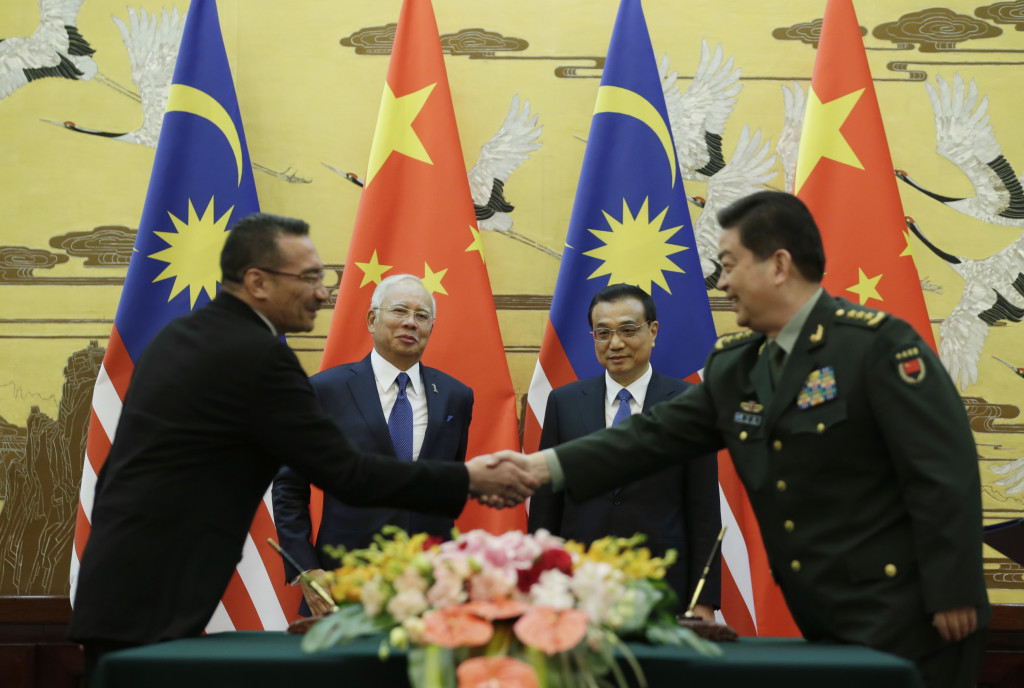Malaysia, China sign defense deal

Malaysia’s Prime Minister Najib Razak, center left, and China’s Premier Li Keqiang, center right, attend a signing ceremony following their meeting at the Great Hall of the People in Beijing Tuesday, Nov. 1, 2016. AP
BEIJING—Malaysia has agreed to buy four Chinese naval vessels and pledged with China to handle South China Sea disputes bilaterally, a Chinese official said on Tuesday, in what could be China’s latest counter to US influence in the region.
The vessels are known as littoral mission ships, small craft that operate close to shore. Two will be built in China and two in Malaysia, Malaysian state media reported after a meeting between Chinese Premier Li Keqiang and his visiting counterpart, Prime Minister Najib Razak.
“I call this a landmark decision because before this we have not bought such vessels from China,” Najib later said.
The move marks Malaysia’s first significant defense deal with China at a time of rising tension in the South China Sea.
Malaysia has historically acquired the bulk of its major defense hardware from the United States, Russia and European countries.
Article continues after this advertisement“Leaders of the two sides agreed to further advance the proper settlement of the South China Sea issue with dialogue through a bilateral channel,” Chinese Vice Foreign Minister Liu Zhenmin told reporters at Beijing’s Great Hall of the People where Li and Najib met.
Article continues after this advertisement“Obviously the launching of naval cooperation between the two sides is significant for our bilateral ties. It’s a reflection of the very high level, mutual political trust between our two countries,” Liu said.
China claims most of the South China Sea as its territory. But Brunei, Malaysia, the Philippines, Taiwan and Vietnam also have rival claims to parts of the waterway, which commands strategic sea lanes that carry some $5 trillion worth of trade a year.
Money-laundering scandal
The push to strengthen China ties comes after July lawsuits filed by the US justice department implicating Najib in a money-laundering scandal.
Najib has denied any wrongdoing and said Malaysia would cooperate in the international investigations.
“I think there’s a mischaracterization here. There’s no such thing as using our financial muscle to improve ties,” Liu said in response to a reporter’s question on the issue.
Both nations also signed deals for collaboration to build rail projects in Malaysia, which included the 5-billion-ringgit ($13.2-billion) East Coast Rail Line.
Najib told Malaysian state news agency Bernama that both countries had made a historic achievement by signing 14 agreements totaling 143.64 billion ringgit ($34.4 billion).
Historic high
“I believe this visit will bring our bilateral ties to a new high … a historic high,” Najib said prior to meeting with Li.
Asked for details of the defense arrangement, Liu said that the two countries were “focusing on naval cooperation,” adding that the deal “marks a big event in our bilateral ties.”
“China and Malaysia are littoral states of the South China Sea so we need to enhance our cooperation to ensure peace and stability in the South China Sea and enhance our mutual trust,” Liu said.
Last month in Beijing, President Duterte stunned observers by announcing his country’s “separation” from the United States.
Although the Philippine leader subsequently backed off, saying their alliance remained intact, the episode underlined China’s increasing diplomatic and economic gravitational pull at the expense of the United States.
Later this week, Najib will meet President Xi Jinping, as well as Jack Ma, founder of e-commerce giant Alibaba. —REPORTS FROM AFP AND AP